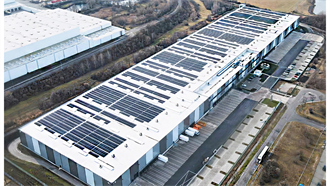The time when logistics landlords could simply focus on leasing an empty box to tenants is over, according to Thomas Proctor, CEO of proptech specialist The Network Control Group (NCG), who argues that today’s warehouses need to be 'plug and play’.
As the name might imply, NCG provides the technology backbone for business premises, from industrial estates to micro-fulfilment centres and more, and Proctor says that today’s tenants increasingly demand top tier internet connectivity as standard. ‘It can take 90 days to connect a warehouse to a fibre network. For many of today’s tenants, that’s too long,’ he says. That means that Proctor’s firm has rapidly moved from offering fit outs to occupiers to working directly with landlords ‘that want to supply business-ready spaces’, he notes.
One of the most conspicuous tenant types on Proctor’s radar right now is the dark kitchen and ten-minute delivery business, for whom stable internet is baked in to the business model. ‘NCG was set up to serve the office industry in September 2019,’ Proctor explains, ‘but as the pandemic hit, we saw a need to evolve.
'We moved quickly into the urban logistics space by signing large service deals with dark kitchens in industrial locations that had never been near a fibre network. These tenants suddenly had 60-70 kitchens which required fast internet immediately and 24/7-hour access to all the delivery apps. If your site goes down for 2-3 minutes, that can kill your ranking on the food app,’ he explains. ‘Our business proposition involves taking enterprise and central London-style office services and providing them all over multi-let industrial sites, with urban logistics being a major part of that story. As occupiers increasingly leave the centre of big cities, there is demand for this everywhere.’
Berlin-headquartered last mile food delivery start-up Gorillas is a key client, for whom NCG has helped connect multiple micro-fulfilment sites across the UK. ‘Behind all of this is the idea of the 10-minute city – delivering food within a 10-minute slot – and your internet cannot let you down,’ Proctor adds.
Green light from landlords
Some of the world’s biggest logistics landlords are now switching on to the idea that sites need to be business-ready to attract top tenants. Proctor refers to players such as Segro which are now launching new concepts that will contain pre-installed services that have been typically found in the flexible office world up until now. ‘These are likely to kick off a similar immediate occupation and smart technology revolution, as is already found in that space,’ he says.
Proctor also notes that landlords who aren’t savvy about the importance of the internet will soon lose out on certain tenants. ‘One of Gorillas’ main rivals in the dark kitchen and cooked food delivery space won’t move into a location now unless the landlord pays for the connectivity,’ he says.
The shift in expectations dates to the start of the pandemic, although many of these businesses' needs were ramping up before then. ‘Landlords used to be able to tell ecommerce occupiers that the internet was their problem to sort out. Now it has to come as standard.’
Needless to say, the big gaps in service provision – both in terms of what landlords have ready and what locations currently offer – means a big business opportunity for NCG. ‘There are still many warehouse locations across Europe which are extremely poorly connected. We are able to go in and set up internal 5G networks as a stop-gap until the fibre is in. This technique allows clients to start working pretty much straight away.’
Fibre’s weak link
Yet Proctor still sees fibre optic broadband as something of a ‘weak link’ in businesses’ internet story. ‘In an ideal world, all businesses would run off a fully wireless infrastructure. But until 5G or its successor is enterprise level, old-fashioned fibre is still at the heart of everything. Very small sites can run on public networks today, but the most usual combination is fibre and fibre plus 5G.’ He adds: 'As land values for industrial and logistics space have grown at a terrifying pace, some of these sites are in increasingly difficult locations barely served by fibre and mobile networks, that were, until recently, all pointed at major population centres and that causes problems.
‘Even those urban logistics sites in cities tend to be in underserved areas or require multi-level permissions to complete installations, upping the complexity once again.'
And the connectivity challenge for cities and private enterprise is likely to remain front of mind for the foreseeable future. ‘The drive to be ever closer to the consumer is relentless. Trends like onshoring are also leading to the construction of warehouses in out-of-the-way locations that don’t need to be particularly close to cities. But all tenants need enterprise-level internet to run Internet-of-Things devices. Thankfully, landlords are finally seeing the light!’
Powering the tech backbone
Enterprise-level connectivity, such as that powered by NCG, can’t come quick enough for a raft of proptech start-ups offering powerful hacks to the tenants of tomorrow. Global venture capital firm Pi Labs is backing two such solutions which promise to make life simpler and more cost-effective for logistics and manufacturing occupiers.
Last year, Fulfilld, a US-based warehouse management orchestration platform, raised $2.5 mln (€2.4 mln) in an oversubscribed seed funding round led by TenOneTen Ventures and co-led by Pi Labs. The platform leverages real-time workforce activity to optimise core warehousing operations via a machine-learning system directing tasks between humans and robots. Its cloud-based technology - powered by digital-twin warehouse virtualisation, 5G, and ultra-wide band connectivity - is targeted at enterprise midmarket customers within the warehousing, manufacturing, wholesale distribution, consumer packaged goods, automotive, and third-party logistics industries.
Faisal Butt, CEO and founder of Pi Labs, notes that ‘human capital is one of the most important factors for us when we conduct our due diligence process’. He adds: ‘Fulfilld is one of the most exciting solutions we have seen developed within the logistics sector, filling a large void in terms of enhancing warehousing operations, particularly at a time of growing labour shortages and supply chain disruption. This investment marks our first investment out of the US. We were impressed by the traction Fulfilld has achieved in the US and saw an opportunity to help accelerate their growth and expansion here in Europe.’
Optimised robots
Waku Robotics, meanwhile, is a Berlin-based company that uses AI-powered software to optimise the performance of robots operating in the logistics and manufacturing space. It has now secured funding from the UK, Germany and Silicon Valley, reflecting advancements in technology which suggest that by 2030, nearly 20 million warehouse jobs will be undertaken by robots.
Waku’s business model helps its customers determine the robot specification that is best suited to different types of logistics workplaces through its comparison platform, Lots of Bots. The platform has almost 200 mobile robots from around 190 manufacturers and is the first of its kind to guide customers through the currently fragmented robotics market.
Another function of its platform, dubbed Waku Sense, is designed to monitor in real time the performance of robot fleets in order to ensure maximum performance and make operating robots seamless and automated.
Pi Labs’ investment in Waku forms part of the proptech VC’s strategy to broadens its international ambition and footprint. Explains Butt: ‘In the past, the benefits of automation were limited because of the high cost of the technology, the considerable time required to implement it and the fact that each machine could perform only one function. Today, though, the emergence of more flexible, intelligent robots is making it more viable.
‘Waku’s platform is taking advantage of the increasing demand for warehouse digitalisation worldwide by helping customers find the best solution to meet today’s exploding fulfilment challenge.’
Adds Sander Nijssen, Co-CEO of Waku Robotics: ‘Funding from investors like Pi Labs will helps us to set up development partnerships with market leaders in the warehousing and manufacturing sectors.
‘What we noticed during Covid is that the interest in robots and proof of concepts on-site accelerated during this time. Clients who are procuring mobile robots noticed that robots bring more reliability to their operations – and warehouse and logistics managers also understand that investing in mobile robots will help achieve a real competitive advantage.’



































